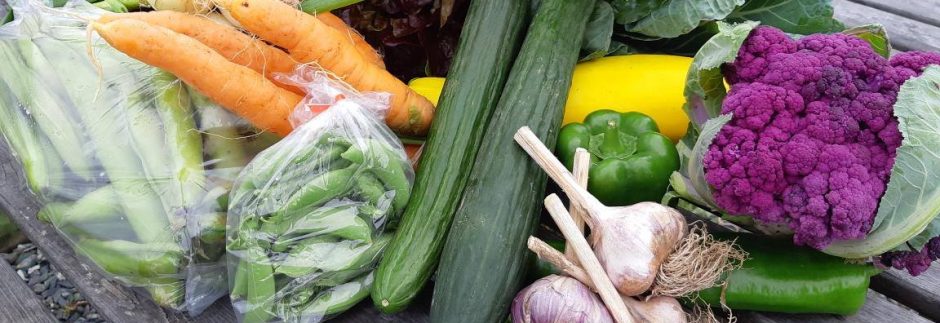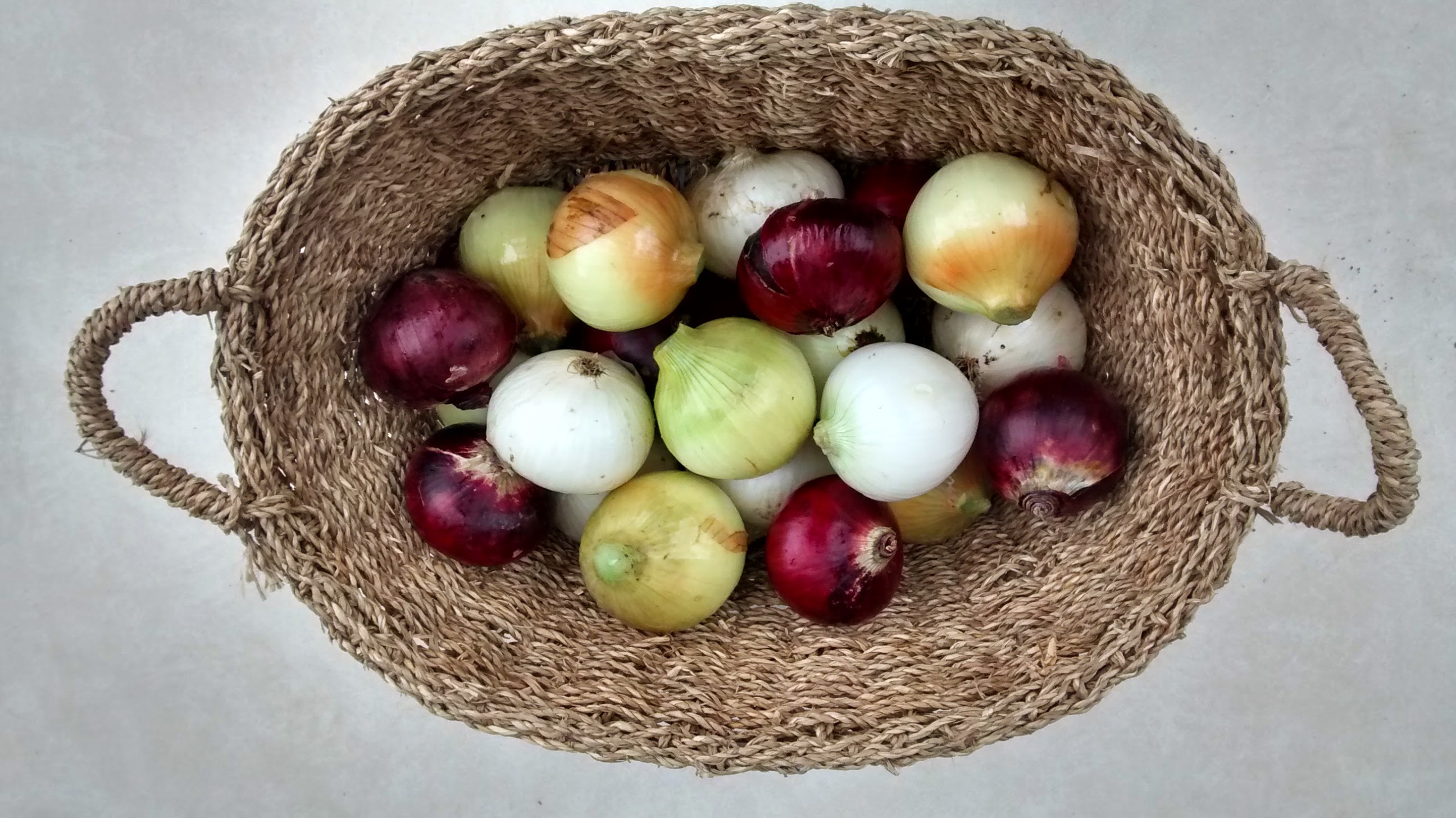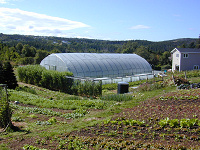By Catherine Mah, 21st September 2014
This is Catherine’s first “note” in what we hope becomes a regular column. If you are interested in contributing to the Organic Farm’s website, feel free to contact us with ideas.This week, I’d like to share some ideas about onions. Onions are the reliable workhorses of vegetable cookery. It is likely that you will have cooked many an onion without giving it a second thought. I am here to entreat you to select and prepare onions with care and patience. They deserve it!
This season we have had a lovely array of onions from the Organic Farm CSA, including new or ’spring’ onions with green tops on, scallions with small bulbs, and the thin, more delicate ‘green onions’ as they are commonly called. Other useful onion family members are shallots, leeks, and chives. (I’ll get to garlic another day.) For many purposes in the kitchen, onions are relatively interchangeable. But choice of onion will change the character of each dish, so it is useful to appreciate the differences in pungency, grassiness, and caramelize-ability for different types of onions, and harness these qualities.
There are red, yellow, and white varieties of sweet and storage onions. Produce specialist Elizabeth Schneider, who has written an excellent compendium on vegetables from A to Z, suggests that ‘sweet’ is an overstatement and simply means that they are mild enough to eat raw. Storage onions are most commonly available at the grocery store.
These are some good general rules of thumb for the types of red, yellow,
and white onions we have gotten from the Farm and that are usually
available at the supermarket.
White onions are the sweetest and least pungent, so they are good raw. This means that they are the ideal choice for uncooked salsas and relishes, and to add a little punch to cold fish and shellfish dishes, sandwiches, and cold soups. It is a perfect time of the year to use
white onion in gazpacho, while tomatoes and peppers are in their prime. Gazpacho is a Spanish cold puréed vegetable soup. My husband taught me how to make gazpacho, like this.
GAZPACHO:
Peel 1 English cucumber and remove the seeds (Ed: an English cucumber is usually seedless) by slicing into quarters lengthwise, and then slicing out the seeds along the length ofeach quarter. This sounds like a bother, but ensures that the soup does not have any trace of bitterness. The seed section can be nice to eat on its own, or dipped in a little salt or sugar. Chop the peeled, seeded cucumber into large cubes. Cube a cup’s worth of nice tomatoes (halve about a dozen of the cherry tomatoes we have been getting from the farm). Larger tomatoes can be peeled if they have thick skins to improve
the texture of the soup. Peel and chop half a red bell pepper, or a few mild red chile peppers with seeds removed. Cube 1/3 of a medium white onion. Place all of the vegetables into a blender and drizzle generously with a tasty olive oil and juice of half a small lemon.
Blend until silky smooth. Add salt to taste. Let chill in fridge for at least 30 minutes before serving. Serve with a bit of fresh ground black pepper and a stick of celery.
Red onions can be eaten raw but are best for this purpose if a sweet variety, new, or sliced very thin. They are delicious when browned slowly like yellow onions below. Red onions are perfect for quick pickles. For a bright, fresh accompaniment to a curry, use red onion in this pickle based on a recipe from Madhur Jaffrey.
ONION RELISH
Grate 2 medium carrots or one medium beet; combine with juice of half a small lemon, 1/8 medium red onion, sliced very thin, pinch of cayenne pepper, ½ cm knob of fresh ginger minced very fine, and a little salt. Let it all sit at room temperature for at least 20 minutes to let the flavours blend before serving.
Yellow onions, including sweet and storage varieties, benefit most from cooking. Patience is key. Do not use non-stick cookware if you want to get the most out of your yellow onions. Onions of all types brown more quickly if cooked in butter, but can also be tended to brown slowly in olive oil. In both cases, low heat will produce a better tasting
finished product. To achieve best caramelization, cook yellow onions like this.
BROWNING ONIONS FOR SOUPS AND STEWS
Add butter or olive oil to a cold stainless steel pan. Use the widest pan you have that will accommodate the onion in a single layer, if possible. Heat the fat slowly over medium-low heat. The butter is ready when it has melted, foamed, and the foam has subsided, but it should not have browned. Olive oil is ready when it begins to shimmer. Alternatively, add a tiny cube of onion to the fat as it is heating up, and you will know when your pan is ready when the onion sizzles. Add the cubed or sliced onion to the pan and immediately stir to coat all the onion in the cooking fat. Spread the onion out so that it is not crowded in any one section of the pan. Let the onion cook, stirring frequently until it becomes translucent. A pinch of sugar can be added at this stage to help the caramelization along, but I generally find that it is not needed. Let the onion continue to cook. Really let the onion brown, stirring occasionally to ensure that it does so evenly. The bottom of the pan will also acquire a bit of colour. Only when the onion is well and truly browned should you consider adding any other vegetables, garlic, salt, or any acidic ingredients which will hinder the browning.
Next time, I will share how to use this great onion foundation to build delicious vegetable and fish soups that do not require stock, only water, and still have plenty of flavour.
Green onions and scallions are a good way to finish a dish. The white part will function similarly to a red onion, in that it can be eaten raw, but can benefit from a little cooking or light pickling/marinating. The green part can be grassy so it should be used sparingly. Green onions or onion tops can be sliced very fine and added to a soup or stew at the end of cooking, right after you turn off the heat. By the time that the dish is served, the residual heat will have mellowed the onion’s flavour but will leave a bit of fresh herbiness comparable to what chives do when added raw.


